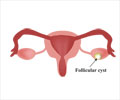Oophorectomy - Procedures
A. Open Abdominal Surgical Procedure
1. After administering anesthesia the abdomen and vagina are prepared with an antibacterial solution.
2. A surgical incision about 5 to 6 inches long or 12 to 15 cms is made either vertically, running from the navel to the pubic bone, or horizontally, running along the top of the pubic hairline. Horizontal incisions leave a less noticeable scar, but vertical incisions give the surgeon a better view of the abdominal cavity.
3. After the incision is made, the abdominal muscles are pulled apart, not cut, so that the surgeon can visualize the ovaries.
4. The ovarian ligaments are identified, which are cut and ligated
5. The ovaries are separated from the surrounding tissues and vessels and are removed. The blood vessels are tied off to prevent bleeding.
6. The fallopian tubes are often removed with the ovaries.
7. Similarly the ovary on the other side is identified and removed, if bilateral oophorectomy is indicated.
8. After ensuring that all the bleeding points have been checked, the abdomen is closed in layers.
The type of surgery for ovarian cysts depends on the nature of the disease, age of the patient, and the patient’s desire to have children.
The advantage of an abdominal incision are that the ovaries can be removed even if a woman has many adhesions from previous surgery. The surgeon gets a good view of the abdominal cavity and can check the surrounding tissue for disease. A vertical abdominal incision is mandatory if cancer of ovary is suspected.
The disadvantage is that it is more painful in comparison to the laparoscopy procedure and has the usual associated complications of open surgical procedures like bleeding, and infections and longer post surgery recovery period.











I had my left ovary,fallopian tube and the cyst removed a week ago. I had a lot of adhesions that is why my left ovary and tube had to be removed. Now am having stabbing pain on my right lower abdomen and some discharges. Discharges were brown and think on the second day post op, red and clotty on the 5th day, today the discharge is black. Can i have some advice please?